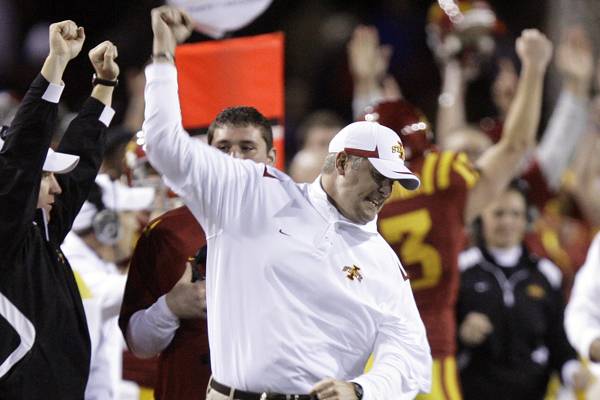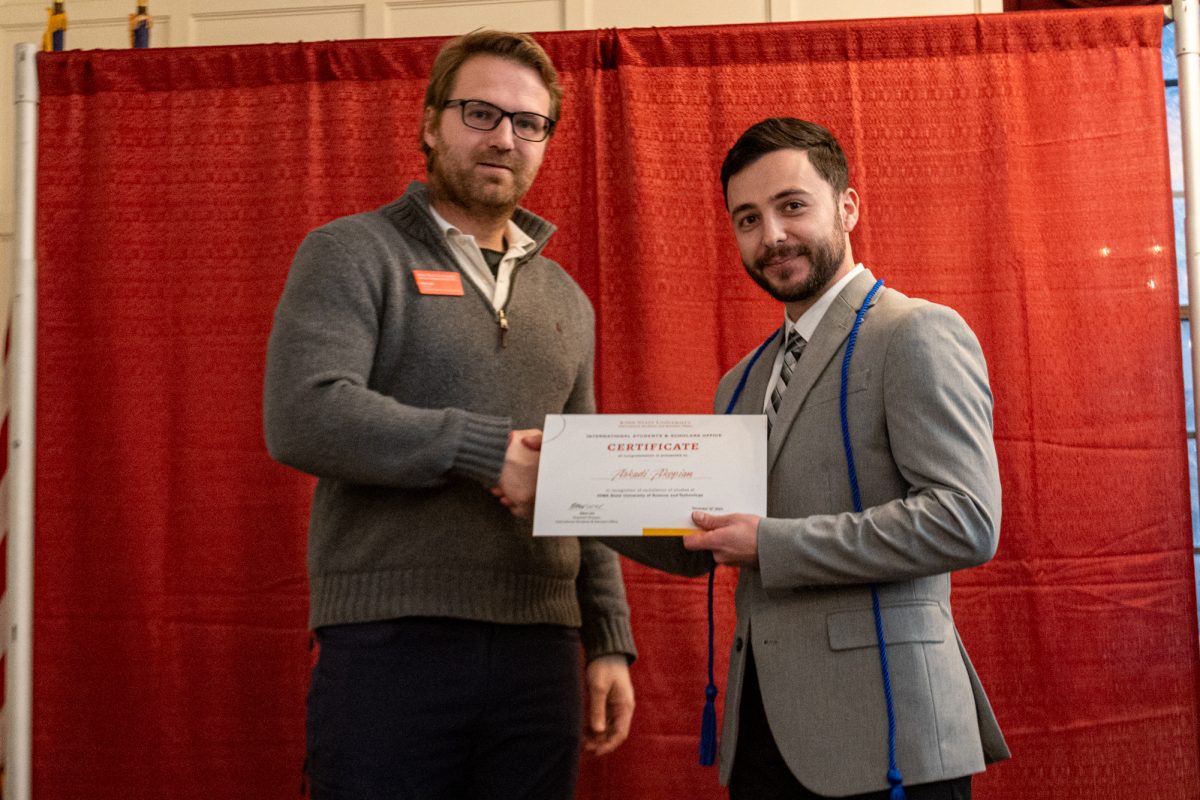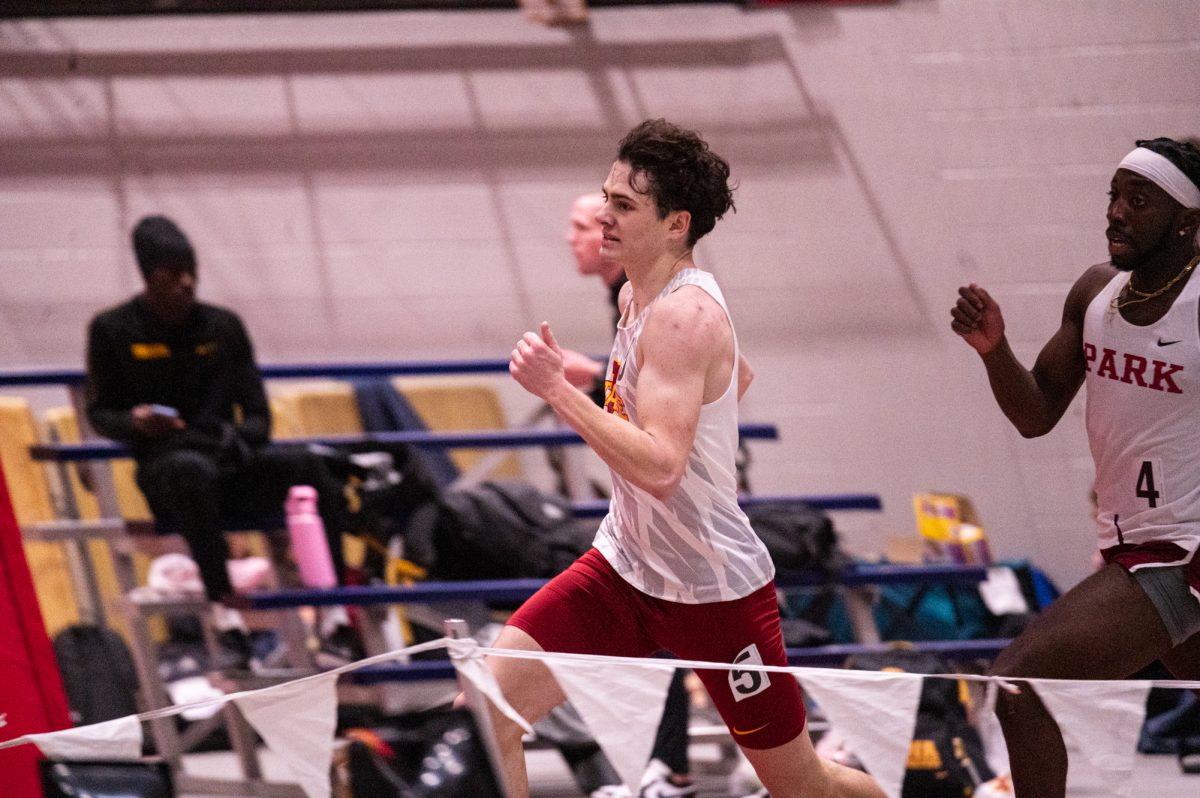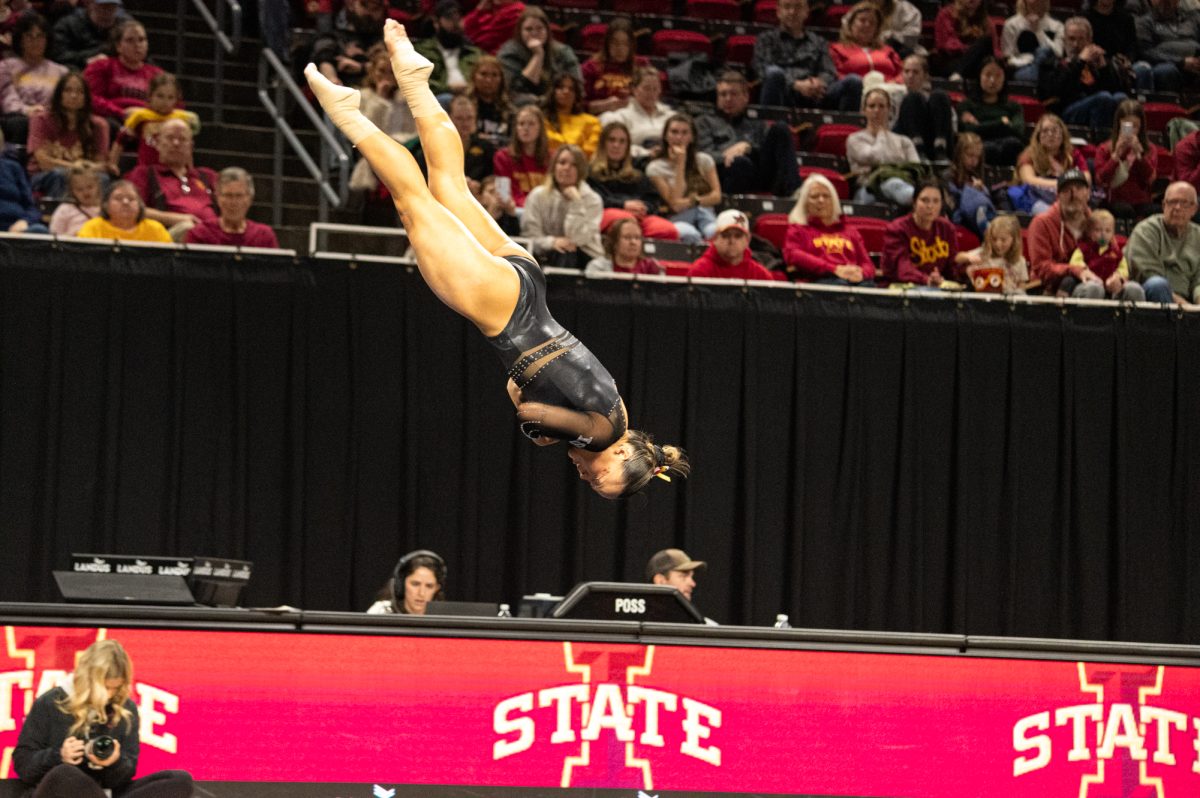FOOTBALL: Building a future

ISU coach Paul Rhoads celebrates after his team sealed the victory in the Insight Bowl on Dec. 31. Rhoads hopes to build on the success of 2009 into 2010 and beyond. Photo: Paul Connors/The Associated Press
January 14, 2010
Editor’s note:
Daily staff writer Jake Lovett recently sat down with ISU football coach Paul Rhoads. This is part two of a two-part series to feature Rhoads and the team’s successes. See yesterday’s paper for a reflection on the 2009 season.
The story is just beginning.
As with all good stories, the hero saved the day, and those he saved feel forever indebted to him and his shining armor.
With this story, though, the hero cannot ride off into the sunset. There is no happily ever after, yet.
But you can rest assured ISU football coach Paul Rhoads wants nothing more than a happy ending.
“What we’re looking to build is a championship program,” Rhoads said Tuesday. “We want to win a Big 12 North title; we want to compete for the overall Big 12 title.”
Rhoads said he’s often wary of becoming satisfied with the successes the program’s seen in his first year at the helm.
Almost as soon as the Insight Bowl was over and the Cyclones had returned from their desert conquest, Rhoads and his coaching staff set out, again, on the recruiting trail, seeking out players to turn a program with only a Co-Big 12 North title under its belt — from the 2005 season — into a championship program.
“You identify recruits, you evaluate recruits, you sign recruits, you develop football players and you learn how to win close football games and move on,” Rhoads said.
Iowa State played in five games decided by seven points or fewer in 2009. The team won three of them, beating Nebraska, Colorado and Minnesota. The Cyclones lost games to Kansas State and Kansas by a total of six points.
“If you’re going to become a championship football program, you don’t lose those two football games,” Rhoads said.
As with this season, Rhoads said he would not define his team’s goals in terms of wins, although the 2009 season will undoubtedly be the measuring stick for the progress Iowa State will make under Rhoads in 2010.
“Our goal is to continue to improve and fight toward becoming a championship program, and we’ll do that on a daily basis,” Rhoads said.
Paul Rhoads’ new kingdom is not the only one in our story.
To the east — roughly 138 miles — lies a kingdom that is reaping the benefits of its own regime change 11 seasons ago.
No, skies haven’t always been bright over Iowa City since Kirk Ferentz was named head coach in 1999, but things have never looked better for Iowa State’s rival in black and gold.
“Everybody wants a program like that,” Rhoads said. “It’s not Iowa State trying to be Iowa … everybody around this part of the country — and from coast to coast — would like to have a program like that one.”
Ferentz was 11-24 in his first three seasons at Iowa, but in his fourth, the Hawkeyes went 11-2 and made a berth in the Orange Bowl, where they lost to USC 38–17, along with winning a share of the Big Ten championship. Since his rough start, Ferentz has gone 70-31 and claimed two conference titles.
“Kirk struggled in his first few years at the University of Iowa,” Rhoads said. “We’re proud to come out of the chute like we did in our first year of, hopefully, many at Iowa State.”
However, Rhoads insisted in not comparing the Cyclones’ potential timeline to that of the Hawkeyes under Ferentz.
Rhoads said it would be “unfair” to the players currently inside the system to put a target date on becoming a championship contender.
Rhoads did say, though, that a championship in 2010 — a year in which the schedule includes home games with No. 18 Utah and No. 21 Texas Tech, and road games with No. 7 Iowa, No. 2 Texas and Oklahoma, which was just one vote outside the final top 25 poll — would be “one heck of a task.”
“I’m not sitting here, pounding my desk, saying, ‘We can do it in 2010,’” Rhoads said, “because the schedule is miserable — it’s a bear. But I’m not going to tell this football team they can’t. We’ll accomplish it when the time arrives.”
There are scribbles all over his desktop calendar, as well as multi-colored Post-It notes with nearly illegible writing on them.
Each day is filled with meetings and team workouts, and two weeks are reserved for just one thing: recruiting.
Rhoads said he is “extremely excited” about his first full recruiting cycle, but acknowledged that he and his staff are far from done.
“We have two more weeks on the road, with little doubt we’re going to end up with a positive, full class,” Rhoads said.
According to espn.com’s Scouts, Inc., Iowa State has 25 players committed for the class of 2010, including six junior college transfers, whom Rhoads expects to make an immediate impact next season.
Scout’s, Inc. ranks eight of the ISU commitments as three-star recruits, but does not rank JuCo transfers on their five-star scale. The Cyclones brought in seven three-star players in last year’s class, and this season, eight is good for 46th nationally. However, Rhoads has yet to bring in any four- or five-star players, something Big 12 rivals Texas and Oklahoma are both ranked in the top 10 in.
Rhoads said he and his coaching staff want to increase the team’s speed on the defensive side of the ball, and he emphasized finding that speed in the secondary and linebacker positions. He also said the coaches want to increase the depth on the offensive line, although just one player from this year’s unit will not return next season.
Three of the three-star commits are offensive linemen while one is a running back; four are on the defensive side of the ball.
“We had good numbers on the defensive side of the ball, but we’re going to be a young football team next year,” Rhoads said. The Cyclones must replace eight starters from their much-improved defense.
Rhoads said his team will be a “young football team that’s a talented football team” and will rely on several true freshmen and the JuCo transfer players.
In 2009, Iowa State got steady production out of junior safety David Sims, who led the Cyclones with four interceptions. Sims transferred into the program from Butte College before the 2009 season.
It will also be key for the freshmen Rhoads brought in during his abbreviated recruiting period after his hire in December 2008 to develop and become everyday players.
“For this program to become an established program that can fight for championships, we’ve got to develop all of that talent,” Rhoads said.
Iowa State will develop its talent from within through its offseason running and lifting program, before starting into its “Fourth Quarter” program the sixth week of the spring semester. Rhoads said the “Fourth Quarter” program focuses more on mental toughness training as much as physical training.
“The culture of your football program and the mental toughness of your football team is built in January through August,” Rhoads said. “This is where you start to win football games … If you don’t start them now, you don’t have a chance in the fall.”
As the bottom of the hour draws near, so does the coach’s next commitment.
He’s scheduled for a 9:30 a.m. film session, studying the new players committed to the program, as well as the players the staff will recruit in the two weeks remaining.
Rhoads tells a story about an article he read, following Texas’ national championship over USC in 2005.
“Stemming from a conversation [Texas coach] Mack Brown had with [legendary Texas coach] Darrell Royal … Royal said ‘Now, that one is gone. Now you’re going to be measured on what you do in 2006,’” Rhoads said. “If you get satisfied … If I sit back here and put my legs up on my desk and start smoking cigars and not worry about every single little thing in the program, then we won’t improve.”
He wants improvement.
Improvement is simple, he said.
It’s in the details.
As he talks, a part of his coaching staff is in a meeting, looking at special teams lineups for the 2010 season.
“Guys over there are meeting about special teams personnel already for 2010,” he said. “Why? Because they can — that’s the right thing to do. They’re already plugging in players for our special teams for 2010. That’s attention to detail. It’s that kind of attention to detail that permeates this program that will allow us to continue to improve, as we move forward.”
Rhoads harkened back to Royal in saying “Status quo is for losers.”
If Iowa State wants the same happy ending its leader is seeking, it must believe that.
He certainly does.






